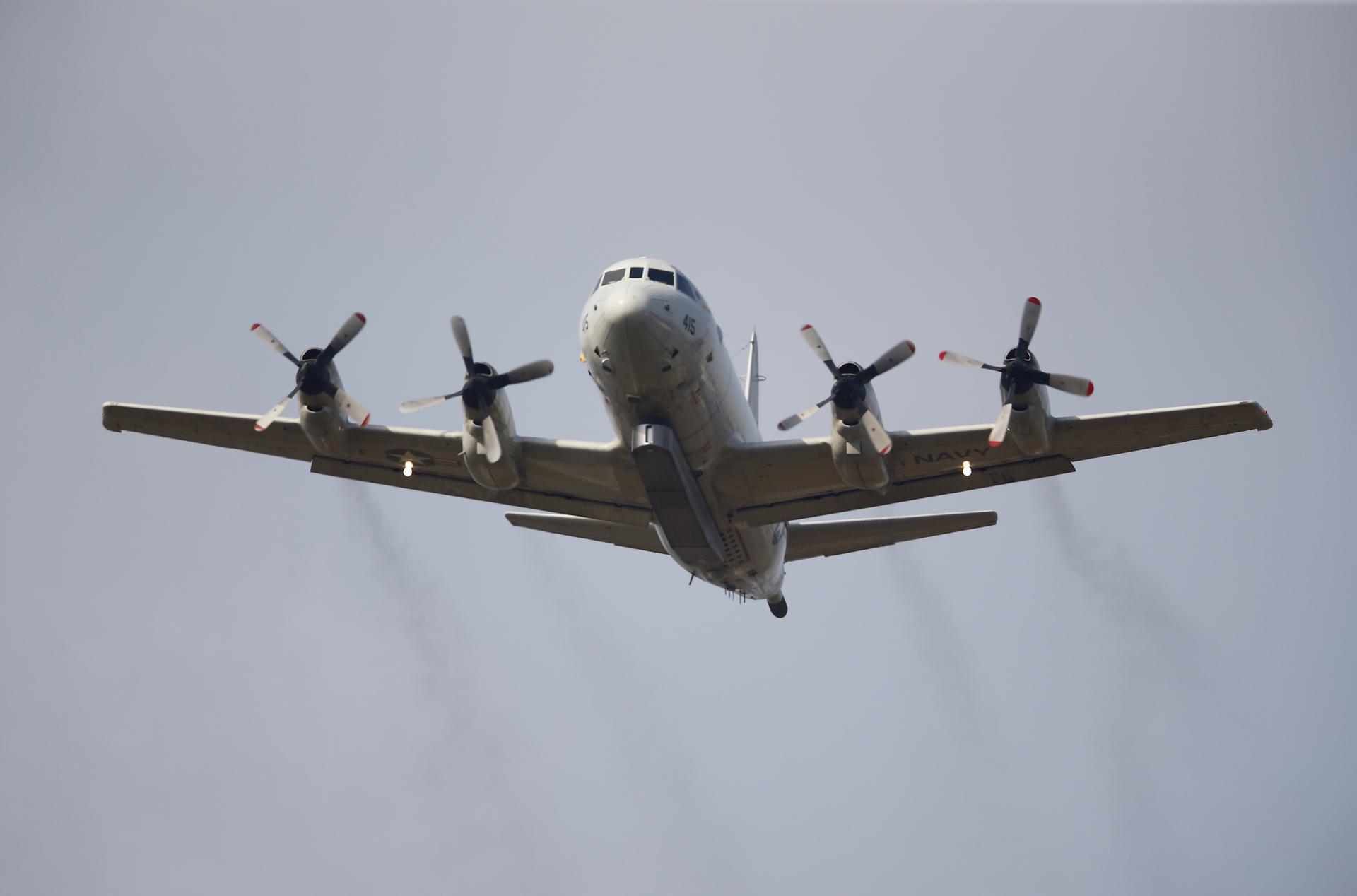A US Navy P-3 Orion Maritime patrol aircraft takes off from Incirlik airbase in the southern city of Adana, Turkey, July 26, 2015. Long a member of the US-led coalition against ISIS, Turkey made a dramatic turnaround this week by granting the alliance access to its air bases and launching air raids against both the forces of ISIS and the Kurdish PKK.
Don’t call it a no-fly zone.
But the Obama administration says it has worked out a plan with Turkey to eradicate ISIS fighters from a band of territory across northern Syria along the border with Turkey.
“What we are talking about with Turkey is cooperating to support partners on the ground in northern Syria who are countering ISIL,” a senior US official told the Wall Street Journal on Sunday, referring to ISIS by one of its acronyms. “The goal is to establish an ISIL-free zone and ensure greater security and stability along Turkey’s border with Syria.”
This represents a policy shift, says political scientist Mehmet Ali Tugtan of Istanbul Bilgi University.
“Up to this point, Turkey was reluctant to extend its cooperation with the United States,” Tugtan says.
In recent days, the Turkish government has given US and allied aircraft permission to launch air strikes from Incirlik Air Base in southern Turkey against ISIS targets inside Syria. Conventional aircraft and drone strikes will now originate from just across the Syrian border, Tugtan says, “which is a huge deal.”
This is not, however, the full-blown western military intervention into the Syrian civil war that some have been calling for. The type of air campaign that took place in Libya in 2011 would require approval at the United Nations Security Council, but Russian and Chinese objections still stand.
This new arrangement gives the US-led bombing campaign far more flexibility. For the last 10 months, American military strikes in Syria have originated in the Persian Gulf. Now, Tugtan says the proximity of Incirlik will makes things much easier for US forces and their allies.
“Turkey has been reluctant to aid the coalition air strikes and open Incirlik,” Tugtan says. That is not because the Turks don’t like ISIS, he says. “But Turkey had been [leveraging] the Islamic State against Bashar al-Assad’s regime in Syria,” Tugtan says.
He adds that Turkey has long been concerned that any battlefield losses for ISIS inside Syria would amount to gains for Kurdish groups operating on both sides of the border. The Turkish government considers Kurds to be separatists, terrorists or both.
That helps explain why Turkey has launched airstrikes against both ISIS fighters and the forces of the outlawed Kurdish Workers’ Party, or PKK.
Turkey’s foreign minister, Mevlut Cavusoglu said on Monday that Kurdish militants might be battling ISIS in Syria, but they should still be treated like terrorists.
“There’s no difference between PKK and [ISIS],” Cavusoglu said. “They are the same. Terrorists are evil. They all must be eradicated. This is what we want.”
Washington might want something different, Tugtan says. The US has coordinated with Kurdish fighters on the ground to attack ISIS.
“It’s not like the Americans have approved Turkish strikes against the PKK,” he says. “But for the time being, they are tolerating it [in return] for continuing Turkish cooperation against the Islamic State.”
Be that as it may, the deal has not gone down well with Kurds, says Ayub Nuri.
He's the English editor of the Kurdish news service Rudaw, and he used to work for The World in Iraq.
“The Kurdish community all over the world — in the Middle East, in Europe or North America — they are not happy at all. They say that Turkey should appreciate the brave fight that the PKK and its branches inside Syria are conducting against ISIS, instead of bombing the PKK. So the Kurds are not happy, and they are equally unhappy with Washington. They believe that Washington has given the green light to go ahead and bomb the Kurdish bases in northern Iraq.”
The PKK fought a long and bloody war for self-rule inside Turkey until 2013 when a fragile ceasefire was established. The ceasefire appears to have been shattered by the Turkish military strikes, says Nuri.
Nuri says the feedback from his Kurdish readers is divided. He says one-half blame the PKK for provoking a conflict, and urge them to support a return to ceasefire. The other half blames Turkey and Washington. “They feel that the US has once again betrayed the Kurds,” says Nuri.
Every day, reporters and producers at The World are hard at work bringing you human-centered news from across the globe. But we can’t do it without you. We need your support to ensure we can continue this work for another year.
Make a gift today, and you’ll help us unlock a matching gift of $67,000!
